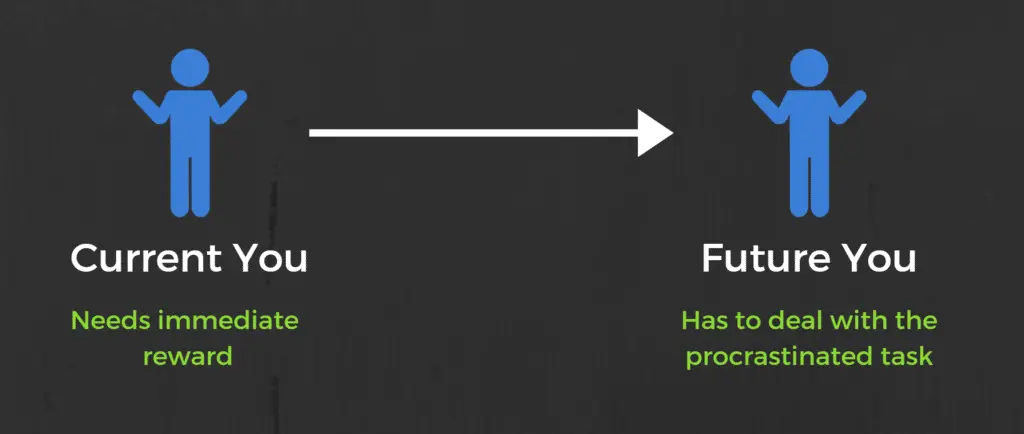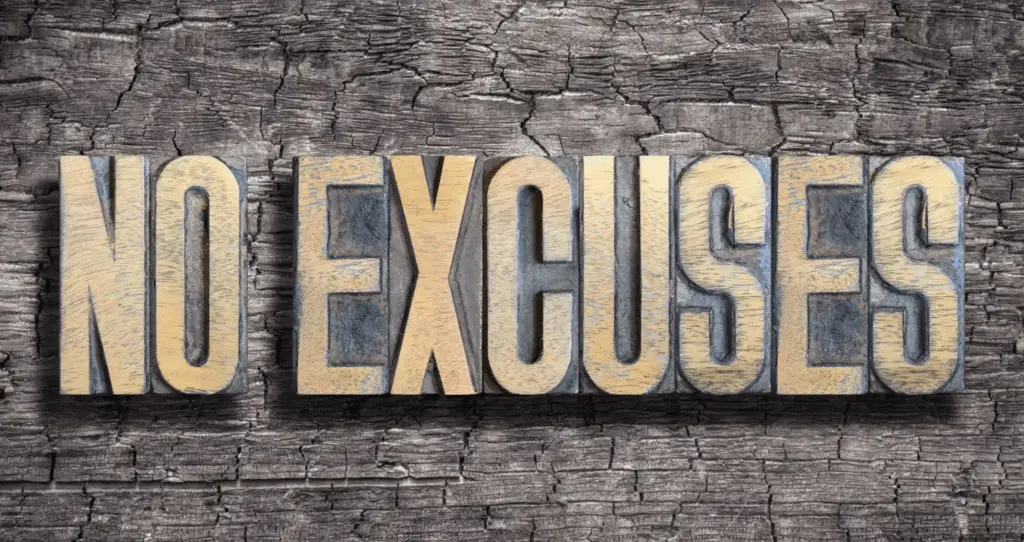This post may contain affiliate links, which means I’ll receive a commission if you purchase through my links, at no extra cost to you. Please read full disclosure for more information.
“I’ll just do it tomorrow.”
That’s what we constantly tell ourselves about various things in our lives. For our chores, diet, and work load, we tell ourselves that we’ll get to it tomorrow. The problem is, we say the same thing tomorrow.
This irrational delaying and postponing of a task is something you are likely guilty of. Don’t worry. We all are.
Procrastination gets the best of us and is hard to fight. In this post, we’ll describe procrastination, what causes one to procrastinate, and 15 tips to overcome procrastination and get things done.
WHAT IS PROCRASTINATION?
Procrastination is the act of avoiding, delaying, or postponing a task that needs to get done. The task is typically put off until the last minute as the deadline for completion approaches.
Procrastination is completely normal and odds are that every single individual has procrastinated on something before. It’s an odd phenomenon because we put things off that we know must get done and we avoid it for as long as we can.
We know there are consequences for doing this, such as having less time and creating more stress in the future. Nonetheless, we still procrastinate when we are well aware that it is a bad idea.
WHY WE PROCRASTINATE?
Procrastination can stem from a combination of factors. We’ll discuss how procrastination is caused by time inconsistency, the 6 triggers, personality traits, and decision making.
Time Inconsistency

There is a phenomenon in behavioral psychology called “time inconsistency.” Time inconsistency is the tendency for humans to value immediate rewards more highly than future rewards.
We seek comfort and pleasure in the short-term instead of enjoying it in the future. This makes sense as to why we would procrastinate.
For immediate rewards, we can avoid a task, and save our time and effort. The downside is that we still have to do the task in the future.
If we valued future rewards more highly, we would do the task asap so we can sit back and relax in the future. Unfortunately, valuing future rewards more than our immediate rewards isn’t our default setting.
The 6 Triggers of Procrastination

Dr. Tim Pychyl is a professor of psychology and the author of Solving the Procrastination Puzzle. Dr. Pychyl says that we procrastinate when a task in unattractive.
Tasks are considered unattractive to us when they have one or more of the following 6 traits:
- Boring
- Frustrating
- Difficult
- Unstructured or ambiguous
- Lacking in personal meaning
- Lacking in intrinsic reward (it isn’t fun)
These are the “6 triggers of procrastination.” Think back to any task you have procrastinated on and it surely exhibited at least one of these traits.
A commonly procrastinated task is writing an essay.
An essay is generally boring unless you like the topic. It can be difficult and frustrating to work on. When you have 5,000 words to write and a blank document in front of you, things will feel unstructured and ambiguous. Other than getting a good grade, writing the essay is meaningless to you and isn’t fun.
The 6 triggers of procrastination are also mentioned in the book **The Productivity Project**.
Personality Traits and Poor Decision Making
Procrastination can be attributable to personality traits and poor decision making.
Those who procrastinate may do the following:
- Ignore the value of time
- Lack self-discipline and motivation
- Lack organizational skills
- Lack self-awareness
- Be indecisive
- Underestimate or overestimate time and effort needed to do something
If you exhibit these traits, it’s not the end of the world. These negative attributes can be unlearned and corrected through the right habits and mindset.
With the 15 tips we’ll share, your traits and decision making will become more aligned with someone who gets things done and avoids procrastination.
15 TIPS ON HOW TO OVERCOME PROCRASTINATION
1. Recognize when you are procrastinating
In order to overcome procrastination, you must first realize that you are procrastinating. Here are some common signs that you may be procrastinating:
- You keep telling yourself you’ll do the task later
- You fill your time with smaller tasks to feel productive
- When you attempt the task, you quickly give up and put it off
- You feel overwhelmed and lost
- You feel unorganized
- You spend too much time thinking about a task instead of taking action
- You consistently do things the day before a deadline
- You run through social media, to-do lists, emails, and other time fillers instead of working
When you exhibit some of these signs, you might not think it’s procrastination in the moment, but it is. To overcome this pitfall, you need to recognize and accept that you are procrastinating. Avoid the denial of it.
2. Just get started, even if it’s small

The remaining tips will all help you in conquering procrastination, but the straightforward solution is to just get started and do the task you are putting off.
It’s that simple, but we constantly look for other ways to help us with doing our work (which is procrastination itself). Looking for the next tip or productivity app is a substitute for the work we should be doing except it makes us feel like we are doing something positive.
Cut that out and just get started on the task, even if it’s small. If you have to write an essay, start by writing the first paragraph. If you have to read a book, begin by reading the first chapter.
The hardest part of completing a daunting task is getting started. Starting small will allow you to conquer a portion of it and build momentum.
3. Plan out your day
One of the 6 triggers of procrastination is when a task is unstructured or ambiguous. This is why writing as essay is so difficult and is frequently a task that students put off.
With a blank word doc, the act of writing is unstructured, ambiguous and is intimidating.
For other tasks you are postponing, you can create structure in your life and for the task by planning out your day. Simply create a schedule and set aside time to work on the task. Add this to your morning routine.
You don’t need to commit one large block of time for the task if you don’t want to. Spreading out the times you work on the task throughout the day can make it less intimidating.
4. Break down tasks into manageable chunks
Leading off the last sentence of tip 3, break down tasks into manageable chunks.
For example, writing these blog posts from scratch is difficult and I’m guilty of procrastinating. To help me push out posts, I break down the task into smaller and manageable chunks. These chunks include:
- Research
- Rough draft
- Final draft
- Upload draft to WordPress
- Edit and add graphics
If I had to tackle all that at once every time, I would never get anything done because the task would be so overwhelming and difficult that I would never even get started.
Breaking the process down into chunks and knocking one chunk out at a time is doable. It allows you to spread the process out over time. Once you complete one chunk, you feel accomplished going into the next chunk.
5. Do harder tasks during your “biological prime time”

In his book, The Productivity Project, author Chris Bailey discusses the concept of your “biological prime time.”
As humans, our energy fluctuates over the course of the day. Maybe you notice how you have endless energy at certain points of the day and other times you are sluggish.
One person’s biological prime time may vary from someone else’s, but take some time to observe when YOU have the most energy. Once you identify that, attempt the task you are procrastinating during those hours. This will increase the odds that you get it done.
6. Don’t blow things out of proportion
Some procrastinators underestimate the effort and time that something needs in order to be completed. These procrastinators wait until the last minute and scramble to make deadlines because they didn’t have enough time.
Other procrastinators overestimate what a task needs to get done. I fall under this category. I always think a task will take a lot longer than it really will and I always think it will take more effort.
Simply put, I blow things out of proportion and create something more intimidating than it needs to be.
If this sounds like you, then my advice is to be realistic when planning your to-do list. Avoid creating a task that is bigger than it needs to be. This will create stress and intimidation that makes you put the task off even longer.
7. Minimize distractions
Once you finally get going on attempting the task, it is easy to fall into the many distractions around us. A factor in completing the task is actually working on it.
Avoid disrupting your work by minimizing distractions. Once you get distracted, it’s hard to get back on track and focus.
The main distraction to minimize is use of your phone. Other distractions to eliminate will depend on the task you are doing. If you are working on something for school or work, clean your workstation and ensure the space is quiet.
8. Eliminate excuses

Procrastination is a form of denial fueled by the excuses that you tell yourself are valid. You tell yourself:
- I’ll actually do this tomorrow. I swear.
- This isn’t THAT important for me to do now.
- It’s not me that’s the problem, it’s this essay.
- Everyone else is waiting to work on this. So will I.
The fact of the matter is that you are trying to massage your ego to avoid confronting the task. You are looking for scapegoats to let yourself off the hook.
You have to be honest with yourself and eliminate the excuses. Once you do, you will have nothing to contemplate. The only option will be to get to work.
9. Reward yourself for getting things done
To give yourself a boost and a pat on the back, you can reward yourself as you cross checkpoints during your task. If you divide a large task into smaller chunks as suggested in tip 4, you can reward yourself after each chunk.
Working through and completing a tough task is largely about mindset and morale. You don’t want to beat yourself and run yourself into the ground.
Keep your morale high by treating yourself often. Rewards will also give you something to look forward to when working on the next phase of a task.
Rewards that I give myself include:
- Social media breaks where I check my phone
- Trips to grab some food
- A walk or run outside
- A workout
- Diving into a new book
10. Set shorter deadlines
Set shorter deadlines and take advantage of Parkinson’s Law.
Parksinson’s law is the idea that work expands to fill the time available for its completion. Basically, if you give yourself a day to write an essay, it will take you a day. If you give yourself a week, it will take you a week. And so forth.
With the more time you give yourself to do something, the task will swell in perceived importance and complexity. This can explain why your dread grows for a task the longer you put it off.
Use Parksinson’s Law to your advantage and set shorter deadlines. When you set shorter deadlines, you will have to complete the task in the allotted time. As a result, you don’t give the task time to swell in importance and complexity.
This is much easier said than done. It requires you to have self-discipline to commit to your artificial deadlines.
11. Focus on goals rather than the task

When a task seems too dreadful to work on, relate it to your longer-term goals and focus on that. If you are procrastinating on going to the gym, think of your goal to get fit and live a healthy life.
If you are putting off building a PowerPoint presentation for work, focus on your goal of getting promoted and rising up in the company.
At any point in time, one individual task can be difficult and frustrating, but that task is probably something that can move you closer or farther from your goals. Seeing the bigger picture can help you realize that you need to get the task done.
Large goals are achieved by reaching numerous smaller goals along the way. Think of the tough task as one of those smaller goals that you need to conquer.
12. Think of your future self
You can think as yourself as having two selves. There is the present you and there is the future you. Procrastination involves putting things off for the convenience of the present you and throwing the task onto your future self.
There is a disconnect between how you view your present self and future self. You are willing to dump tasks on your future self with a constrained timeline.
Psychologists refer to this as “time inconsistency.” It is the tendency for the human brain to value immediate rewards more highly than future rewards.
To illustrate, let’s say you have to do yard work by the end of the day. A non-procrastinator would get the task done ASAP and the future reward would be resting for the remainder of the day.
This is ideal, but the brain favors immediate reward. What is more likely to happen is that you put off the yard work for now (immediate reward) and do the work at the end of the day. You put that work on your future self.
Always consider your future self and don’t screw yourself over. Either way, YOU will have to do the work.
13. List the consequences of putting off a task
Something that can light a fire within you to get a task done is to consider the consequences of putting that task off. The fear that potential consequences can be enough to get you to take action.
For example, imagine that you have been putting off studying for an upcoming interview. You consider the consequences of what will happen if you do not study. They include:
- Looking like a fool during the interview
- Not receiving a job offer
- Remaining unemployed for a longer period of time
- Not having money to pay your bills
- Needing to ask friends or family for financial assistance
Some of these might be worst-case scenario events, but they aren’t impossible. They could happen. Think ahead on everything you do. Consider the potential consequences that inaction could bring.
14. Optimize your body for energy and focus

Things that make a difficult task even harder are low energy and low focus. To overcome procrastination, you want to do things that stack the odds of completing a task in your favor. A huge factor to tilt the odds is how your body is feeling and operating.
Do things to provide your body with energy so you can get things done. Eat healthy, workout, and sleep properly.
Don’t underestimate how important this is. This tip will allow you to implement all the other tips we have discussed.
15. Allow for downtime and rest to avoid burnout
It’s important to balance work with rest to avoid burning out. Once you burn out, you could enter a downward spiral where you have no energy or motivation to get anything done, not just the task you are procrastinating on.
Don’t take this tip as a green light to be lazy and take constant breaks. You’ll have to be honest with yourself on if the break is needed or if you are just using it to avoid work.
Work diligently for bursts of time and reward yourself with breaks. You can break up a task with snacks, socializing, running errands, a workout, or something else to stay productive.
SUMMARY
Procrastination is inevitable, but it can be managed. Use these 15 tips to overcome procrastination and get things done.



